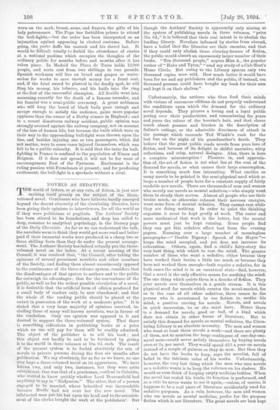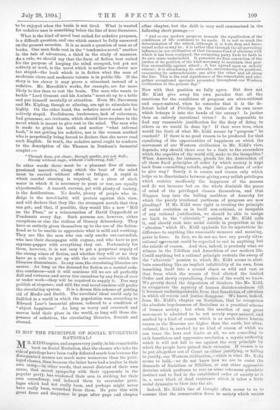NOVELS AS SEDATIVES. T HE world of letters, or at any
rate, of fiction, is just now exciting itself greatly on the subject of the three- volumed novel. Gentlemen who have hitherto hardly emerged beyond the decent obscurity of the circulating libraries, have been giving their opinions to interviewers, for all the world as if they were politicians or pugilists. The Authors' Society has been stirred to its foundations, and deep has called to deep, romance to analytical psychology, in the literary page of the Daily Chronicle. As far as we can understand the talk, the novelists seem to think they would get more read and better paid if their immortal works were produced in a cheap two or three shilling form than they do under the present arrange- ment. The Authors' Society has indeed actually put the three- volumed novel on the index. At a recent meeting of the Council, it was resolved that, "the Council, after taking the opinions of several prominent novelists and other members of the Society, and finding them almost unanimously opposed to the continuance of the three-volume system, considers that the disadvantages of that system to authors and to the public far outweigh its advantages ; that for the convenience of the public, as well as for the widest possible circulation of a novel, it is desirable that the artificial form of edition produced for a small body of readers only, be now abandoned; and that the whole of the reading public should be placed at the outset in possession of the work at a moderate price." It is stated that a very large majority of opinions received, in- cluding those of many well-known novelists, was in favour of the resolution. Only one opinion was opposed to it and desired to support the three-volumed system. That there is something ridiculous in publishing books at a price which no one will pay for them will be readily admitted. The object of the publisher is to sell his book ; and this object can hardly be said to be furthered by giving it to the world in three volumes at 10s. 6d. each. The result of the present system is to forbid absolutely the sale of novels to private persons during the first six months after publication. We say absolutely, for as far as we know, no one ever buys a three-volumed novel on its appearance. We have known two, and only two, instances, but they were quite exceptional. One was that of a gentleman, resident in Calcutta, who wanted to know quickly whether Lord Beaconsfield had anything to say in " Endymion." The other, that of a person engaged to be married, whose betrothed was inconsolable because Mudie had not sent her the new novel. The infatuated man put his hat upon his head and to the astonish- ment of the clerks bought the work at the publishers'. But though the Authors' Society is apparently only aiming at the system of publishing novels in three volumes, "price 31s. 6d.," it is believed that their real intent is to abolish the lending library. Novelists inflamed by stories from abroad, have a belief that the libraries are their enemies, and that if they could only abolish those clearing-houses of fiction, the public would absorb an enormously larger number of their books. " Ten thousand people," argues Miss A., the popular author of "Hubs and Tyres," "read my study of a Cab-Tout's Home Circle. But owing to the Library system only two thousand copies were sold. How much better it would have been for me and my publishers and the public, if instead, ten thousand persons could have bought my book for their own and kept it on their shelves."
Unfortunately, the authors who thus feed their minds with visions of enormous editions do not properly understand the conditions upon which the demand for the ordinary novel depends. They picture a loving and a loyal public poring over their productions, and remembering for years and years the colour of the heroine's hair, and that clever touch about peonies and blushes in the description of Selina's cottage, or the admirable directness of attack in the passage which recounts Ted Winkle's rush for the last bus on the night of his grandmother's death. They believe that the great public reads novels from pure love of fiction, and because of its delight in skilful narrative, witty reflections, and crisp, natural dialogue. Alas, there is here a complete misconceptionI Pleasure in, and apprecia- tion of, the art of fiction is not what lies at the root of the demand for novels, or what causes their large consumption. It is something much less interesting. What enables so many novels to be printed is the semi-physical need which so large a number of people have for a constant supply of fairly readable new novels. There are thousands of men and women who merely use novels as mental sedatives,—who simply want them to steady their nerves. Almost all people who use their brains much, or otherwise exhaust their nervous energies, want some form of mental. sedative. They cannot rest while they are doing nothing. In order to quiet the thinking organism it must be kept gently at work. The easier and more mechanical that work is the better, but the mental powers must just be kept running. Some people find they can get this sedative effect best from the evening papers. Running over a large number of meaningless paragraphs—" Double Bigamy : Speech of the Mayor "— keeps the mind occupied, and yet does not increase its exhaustion. Others, again, find a child's fairy-story the very best thing with which to rest the mind. The greater number of those who want a sedative, either because they have worked their brains a little too much or because they have not worked them enough—both require a sedative, for in both cases the mind is in an unnatural state—find, however, that a novel is the only effective means for soothing the mind. The one thing which quiets them is a douche of fiction. They pour novels over themselves in a gentle stream. It is this physical need for novels which creates the novel-market, for as in the case of all other sedatives, there comes to the person who is accustomed to use fiction to soothe his mind, a positive craving for novels. Novels, and novels in quick succession, he or she must have. Hence there is a demand for novels, good or bad, of a kind which does not obtain in other forms of literature. But to satisfy this demand for novels as mental sedatives, the Circu- lating Library is an absolute necessity. The men and women who want at least three novels a week—and there are plenty of them, not to mention the large contingent of one-day-one- novel men—could never satisfy themselves by buying novels even at 2s. per novel. They would spend £15 a year on novels instead of a couple of guineas as they do now. But then they do not have the books to keep, says the novelist, full of belief in the intrinsic value of his works. Unfortunately, however, the very last thing which the man who uses novels as a sedative wants is to keep the volumes on his shelves, He would as soon think of keeping empty medicine bottles. When the novel has rested his brain, its function is performed, and as a rule he never wants to see it again,—unless, of course, it happens to be a real piece of literature accidentally used for sedative purposes. As a rule, however, the men and women who use novels as mental medicine, prefer for the purpose fiction which is not literature. The great novels are best kept to be enjoyed when the brain is not tired. What is wanted for sedative uses is something below the line of true literature.
What is the kind of novel best suited for sedative purposes, is a difficult question, and one which cannot be fully answered on the present occasion. It is as much a question of men as of books. One man finds rest in the " tendencies novel," another in the tale of adventure, a third in the study of manners. As a rule, we should say that the form of fiction best suited for the purpose of keeping the mind occupied, but yet not actively at work, is the novel which is neither too clever nor too stupid—the book which is in fiction what the man of moderate views and moderate talents is in public life. If the story is too clever it may prove a stimulant instead of a sedative. Mr. Meredith's works, for example, are far more likely to tire than to rest the brain. The man who wants to tackle " Lord Ormont and his Aminta " must sit up to a table and put himself mentally at attention. Even Mr. Stevenson and Mr. Kipling, though so alluring, are apt to stimulate too highly. On the other hand, the sedative novel must not be actively stupid. Foolishness, irrelevance, lack of coherence, bad grammar, are irritants, which should have no place in the novel which is meant to give rest to the mind. The man who is made to grind his teeth and mutter "what infernal bosh," is not getting his sedative, nor is the woman soothed who is perpetually being forced to declare that she never read such English. In truth, the sedative novel ought to conform to the description of the Thames in Denham's immortal couplet :— " Though deep, yet clear; though gentle, yet not dull; Strong without rage; without o'erflowing, full."
In other words there must be a pleasant flow of unim- passioned narrative, along which the boat of the mind must be carried without effort or fatigue. A rapid in which careful steering is required, or a piece of slack water in which it is necessary to punt or row, are equally objectionable. A smooth current, yet with plenty of variety, is the desideratum. No doubt, plenty of people who in. dulge in the novel-habit will protest against this view, and will declare that they like the strongest novels that they can get ; and that, if possible, they would like a new " Mill on the Floss," or a reincarnation of David Copperfield or Pendennis every day. Such persons are, however, either exceptions or else the victims of literary debauchery. They have so entirely given themselves up to the use of the fiction- fiend as to be unable to appreciate what is mild and soothing. They are like the men who can only smoke cut-oavendish, who lace their champagne with cognac, and who have to put cayenne-pepper with everything they eat. Fortunately for them, however, it is not easy to get a perpetual supply of the strong wines of fiction, and whether they will or no they have as a rule to put up with the vin ordinctire which the libraries disseminate. In any case, the circulating libraries are secure. As long as the demand for fiction as a mental seda- tive continues—and it will continue till we are all perfectly dull and virtuous, and never tire ourselves by any form of over or under work—they will be required to supply it. You may publish at sixpence, and still the real novel-readers will prefer the circulating system. It is a dream this scheme of getting rid of Mudie and Smith. The novelists' ideal could only be fulfilled in a world in which the population was, according to Edward Lear's immortal phrase, reduced to a condition of "abject happiness." As long as worry and overwork and nerves hold their place in the world, so long will those dis- pensers of sedatives, the circulating libraries, flourish and abound.



































 Previous page
Previous page